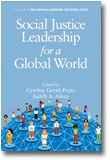
Social Justice Leadership for a Global World
Edited by:
Cynthia Gerstl-Pepin, University of Vermont
Judith A. Aiken, University of Vermont
A volume in the series: Educational Leadership for Social Justice. Editor(s): Jeffrey S. Brooks, Curtin University. Denise E. Armstrong, Brock University. Ira Bogotch, Florida Atlantic University. Sandra Harris, Lamar University. Whitney Sherman Newcomb, Virginia Commonwealth University. George Theoharis, Syracuse University.
Published 2012
The global economic meltdown has highlighted the interconnectedness of nations. This book seeks to provide an overview of topics, issues, and best practices related to defining social justice leadership given our increasingly global world. Refugees and immigrants from around the globe now inhabit schools and institutions of higher education across the nation and US students, teachers, and leaders are traversing international boarders both physically and virtually through international collaboration, technology, and exchange programs. Although there have been increased efforts and scholarship in support of diversity and multicultural awareness, these efforts have largely focused on the US. We acknowledge that many leadership theories are “domestic” in that they typically incorporate US perspectives or a single-culture description of effective leadership. This book provides a deeper understanding of diverse and multicultural perspectives as they relate to a world that is becoming increasingly interconnected economically, socially, and culturally. Particular attention is paid to providing specific strategies for social justice leaders working in PK-12 and/or higher education, and leadership preparation programs to promote effective leadership that reflects multicultural understanding of the diversity both within and outside the US. Within the context of leadership practice, internationalization offers new insights and ideas about leadership aims, processes, and competencies as a means for addressing equity concerns throughout PK-20 education.
CONTENTS
Series Editor’s Preface, Jeffrey S. Brooks. Preface: Social Justice Leadership for a Global World. SECTION I: FRAMEWORKS FOR CONCEPTUALIZING INEQUALITY. Sociocultural Factors Affecting Minority Achievement: What Every School Leader Should Know, Charles Williams. Creating Safe LGBT School Environments for Students and Staff, Tiffany Wright and Nancy Smith. Overcoming Cultural Collision in Educational Leadership: A Global Ethical Analysis, Lisa Bass. SECTION II: INTERNATIONAL AND GLOBAL PERSPECTIVES ON SOCIAL JUSTICE LEADERSHIP. Contested Power! College Heads in the Muslim Society of Pakistan, Saeeda Shah. Instructional Leadership in American and Chinese Schools: A Comparative Case Study, Anna Q. Sun. Social Justice and Multicultural Leadership in Taiwan: Empowering New Immigrants, Yu-min Chien and Hsiang-I Chiu. Considering Incompatibility: Promoting Culturally Relevant Teaching and Learning in the United States and New Zealand, Jennifer J. Huber, Anne Hynds, Seena Skelton, Amy M. Papacek, Taucia Gonzalez, and Lisa Lacy. Lessons from Differences: The Search for Social Justice Leadership in Education, Dennis Conrad, Deborah Conrad, Anjali Misra, and Michele Pinard. Crumbling Barriers: A Comparative Study of International Teachers’ Experiences of Educational Leadership in Their Home Countries and the United States, R. Martin Reardon and Risha R. Berry. SECTION III: STRATEGIES FOR DEVELOPING SOCIAL JUSTICE LEADERS. Using Documentary Film to Teach Social Justice and Global Awareness in Educational Leadership, Joseph A. Polizzi and Erin San Clementi. Transpositions Toward Becoming Leading Subjects, Kelly Clark-Keefe and Vachel Miller. Learning from Failure: Relational Humility and Leadership for Global Realities, Francois J. Guilleux. Transformative School Leadership: Deconstructing Self and Agency in a Global World, Lyndsay J. Agans and Susan Korach. Preparing Culturally Competent Instructional Leaders, Maysaa Barakat, Ellen Reames and Lisa Kensler. SECTION IV: STRATEGIES FOR K–12 SOCIAL JUSTICE LEADERSHIP. Changing Complex Educational Systems: A Framework for Collaborative Social Justice Leadership, Elizabeth Kozleski, David Gibson and Anne Hynds. Cross-Boundary Leadership: A Reform Model in Title I Elementary Schools, Gaetane Jean-Marie and Katherine A. Curry. Toward a More Perfect Union: Culturally Responsive Leadership through Social Justice, Rhonda Blackwell-Flanagan. Narrative Inquiry as a Culturally Relevant Leadership Strategy for Social Justice, Alexandre Ilungu Muzaliwa and Mary E. Gardiner. Culturally Responsive Leadership Strategies to Promote Multicultural Teaching, Jasmine Peña. SECTION V: STRATEGIES FOR HIGHER EDUCATION SOCIAL JUSTICE LEADERSHIP. Think Justice: Pushing The Boundaries of Black College Presidential Leadership, Marybeth Gasman, Jameel Scott, and Nelson Bowman III. Using the Equity Scorecard to Identify and Close Gaps in Educational Outcomes, Abbie Robinson-Armstrong. Making a Case for Education Evaluation with a Diversity Lens, Diane R. Fuselier-Thompson. Providing a Culturally Responsive Experience for Foreign Students in U.S. Higher Education, Clementine Msengi, Israel G. Msengi, and Sandra Harris. “Do You Hear What I Hear?” Culture and Communication in Teacher Education, Michelle L. Page. About the Editors. About the Contributors.
-
Paperback978-1-61735-924-8
Web price: $62.04 (Reg. 72.99)
-
Hardcover978-1-61735-925-5
Web price: $89.24 (Reg. 104.99)
- eBook978-1-61735-926-2

- EDU032000 - EDUCATION: Leadership
- EDU029040 - EDUCATION: TEACHING METHODS & MATERIALS: Social Science
- EDU001000 - EDUCATION: ADMINISTRATION: General
-
 Adult Intentions, Student Perceptions
How Restorative Justice is Used in Schools to Control and to Engage
Adult Intentions, Student Perceptions
How Restorative Justice is Used in Schools to Control and to Engage
-
 Crossing the Bridge of the Digital Divide
A Walk with Global Leaders
Crossing the Bridge of the Digital Divide
A Walk with Global Leaders
-
 Dear Gay, Lesbian, Bisexual, And Transgender Teacher
Letters Of Advice To Help You Find Your Way
Dear Gay, Lesbian, Bisexual, And Transgender Teacher
Letters Of Advice To Help You Find Your Way
-
 Envisioning a Critical Race Praxis in K-12 Education Through Counter-Storytelling
Envisioning a Critical Race Praxis in K-12 Education Through Counter-Storytelling
-
 Restorative Practice Meets Social Justice
Un-Silencing the Voices of "At-Promise" Student Populations
Restorative Practice Meets Social Justice
Un-Silencing the Voices of "At-Promise" Student Populations
-
 School Leadership in a Diverse Society
Helping Schools Prepare all Students for Success (2nd Edition)
School Leadership in a Diverse Society
Helping Schools Prepare all Students for Success (2nd Edition)
-
 Within Reach
Providing Universal Access to the Four Pillars of Literacy
Within Reach
Providing Universal Access to the Four Pillars of Literacy

